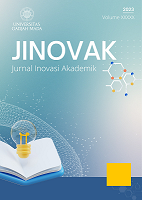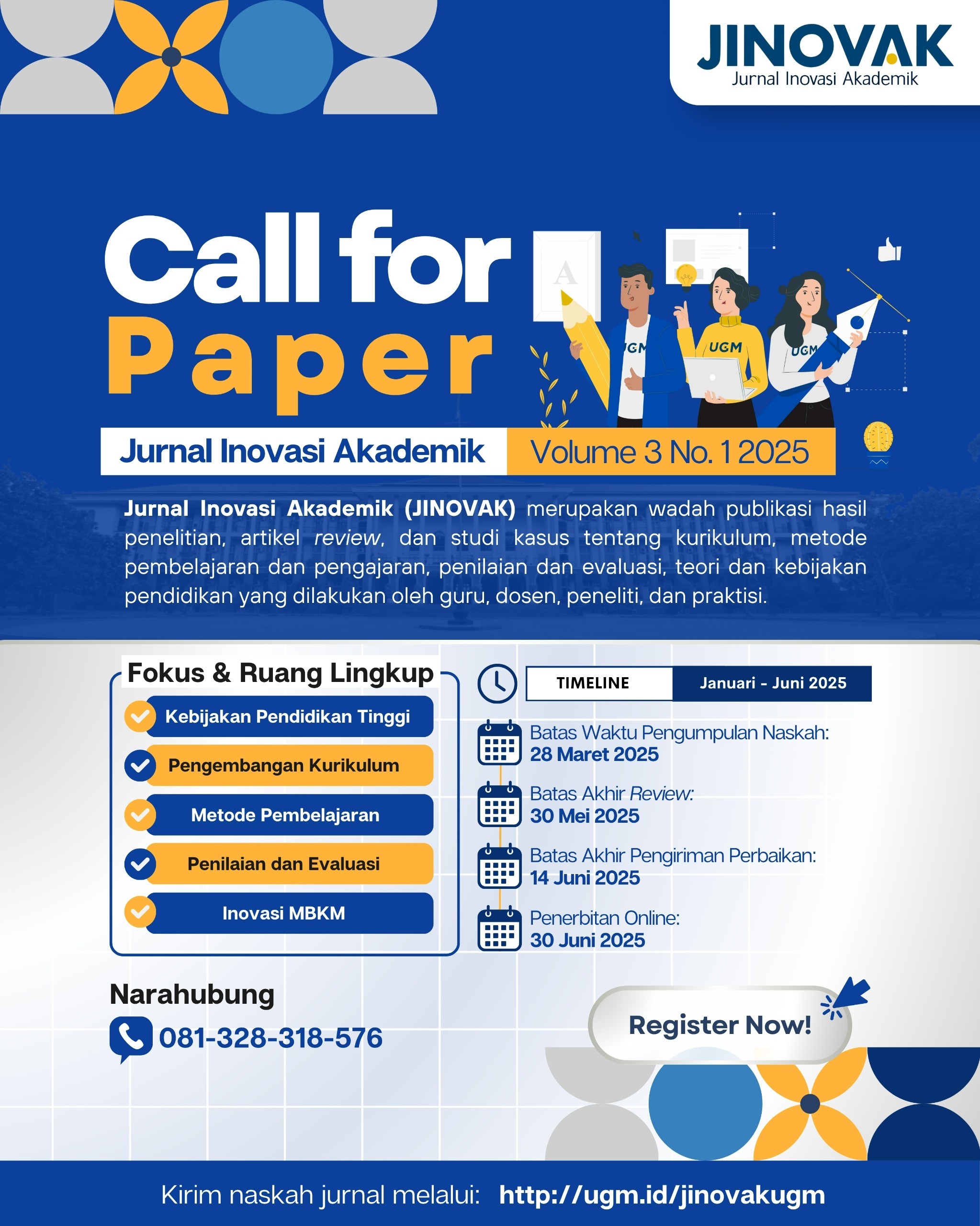Publication Ethics
Below are the ethics that must be upheld by authors, editors and reviewers of JINOVAK.
Authors
- Reporting standards
The authors should provide an accurate description of the accomplished work, an objective discussion, and urgency. Also, they should honestly present the results or thoughts without inappropriate data falsification, forgery, or manipulation. The manuscript is presented in detail with references, hence it can be replicated by others. In addition, the authors are highly obliged to avoid intentional fraud in any form, one of which is inaccurate statements.
- Originality and Plagiarism
The authors are not allowed to submit the same article manuscript to others without the knowledge of the Journal of Academic Innovation editors. Furthermore, there should be a confirmation that the submitted manuscript is the original work. Previous relevant works, either their own or others, should be acknowledged and properly referenced.
- Multiple, Redundant, or Concurrent Publications
The authors are not allowed to simultaneously publish research manuscripts in more than one journal. Duplicate publications are a highly unacceptable publishing ethics violation
- Acknowledgment of Sources
The authors should cite all data sources and information used in their research manuscript. Also, personal information obtained, such as conversations, correspondence, or discussions with third parties, cannot be used in the manuscripts without written permission from the source.
- Authorship of the Paper
The inclusion of author names should be limited to those who have genuinely contributed to the manuscript writing. Other parties who contribute to the writing are included in the list of co-authors, while technical assistance or less substantial contributions are mentioned in the acknowledgment section.
- Disclosure and Conflicts of Interest
The authors should openly disclose any financial or substantive conflicts of interest that may affect the manuscript results.
- Fundamental Errors in Published Works
If any fatal errors or significant inaccuracies are found in the submitted manuscript, the authors should inform the editors or publishers and collaborate to cancel or correct the manuscript.
- Hazards and Human or Animal Subjects
If it involves hazardous chemicals, procedures, or equipment, then the authors should identify them in the manuscript.
Editors
- Publication Decisions
The editors are responsible for deciding the acceptance and publication of the manuscript. There are procedures and policies in place to ensure the quality and integrity of the published journal. Also, the editors may accept, reject, or request modifications to the manuscript. They are guided by the journal's editorial policy and are limited by legal requirements related to defamation, copyright infringement, and plagiarism. In addition, consultation may be needed with other editors or reviewers (or public officials) in making this decision.
- Review of Manuscripts
The editors should validate the authenticity of each manuscript, arrange for fair and wise peer review distribution, and provide detailed information about the review process to the peer reviewers.
- Fair Play
The editors objectively evaluate the manuscript, regardless of the authors' race, gender, religion, or nationality. They uphold integrity, as well as make fair and impartial decisions.
- Confidentiality
The editors are not allowed to disclose information about the manuscript to anyone other than the authors. They should ensure that information about the submitted manuscript is kept confidential.
- Disclosure and Conflicts of Interest
The editors are not allowed to use unpublished material from the manuscript for personal research without the authors' permission.
Reviewers
- Confidentiality
Reviewers are not allowed to disclose information about the manuscript to anyone other than the authors. The information about the submitted manuscript is kept confidential.
- Acknowledgment of Sources
Reviewers should ensure that the authors have cited all data sources. Furthermore, identification is needed on relevant cited publications. Any observations, derivations, or arguments made by the reviewers should be accompanied by relevant explanations. The reviewers should promptly notify the journal if they find any deviations in writing ethics, substantial similarities between the manuscript, and simultaneous submissions to other journals.
- Standards of Objectivity
The review should be objective and provide detailed feedback with supporting arguments. The reviewers are also required to provide constructive feedback (comments and critiques).
- Disclosure and Conflict of Interest
Reviewers are not allowed to consider manuscripts that have conflicts of interest, competition, cooperation, or other relationships with the authors, company, or institution associated with the paper.
- Promptness
The feedback should be provided within the specified time. If the reviewers cannot complete the review within the specified time, they may inform the editor, hence the manuscript can be sent to another reviewer.


.png)

